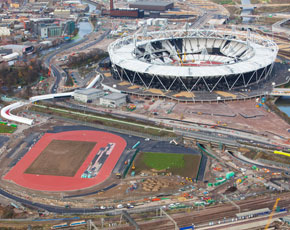The Paralympic Games was the largest live broadcast undertaking for Channel 4, but also gave the IT team an equally complex project that presented a range of new challenges and had to be executed under very tight deadlines.
To broadcast more than 500 hours of sport, C4 kicked off its preparation when it won the bid in 2010, with IT a key component of the plans. But in practice, the team only had 10 days to put the necessary technology infrastructure in place at the International Broadcasting Centre (IBC), after the end of the London 2012 Olympic Games.

Work carried out by C4's partner Computacenter involved setting up network connections between C4 and the Olympic Park, with connectivity to base at 100Mbps. The company partnered with sports specialists Sunset & Vine and IMG Sports Media for production of the content - as such, broadcast and streaming data go through separate networks. IT work also included the roll out of a sturdier video-conferencing set-up, Wi-Fi connections and laptops for the team.
A content management system, provided by Italian sport media services company Deltatre, has also been rolled out to support web coverage of the sports events. The broadcaster used similar tools for its online coverage of the 2011 IAAF World Championship in athletics in South Korea and the BT Paralympic World Cup in Manchester.
"The Paralympics is definitely the biggest thing we have ever done. We have done major sporting events before, but nothing as large as this event, where we totally focused the schedule on one thing for nearly two weeks," says Channel 4 CIO Kevin Gallagher.
"But the main thing from an IT point of view was about execution. We only had access to the site about three days after the closing ceremony of the Olympics, so we had to move pretty quickly," he says.
"There is only so much preparation you can do with things that are live, but there is no second chance, you have to get it all sorted immediately."
Mobile and web focus
Channel 4's special website for the Paralympics has had over 10 million page views since its launch and, according to Gallagher, there will be well over one million streams on the web by the end of the Games. The website showcases on-demand highlights of events as well as news stories, live text commentaries, results and medal tables, individual profiles of all ParalympicsGB athletes and video guides to particular sports.
"We realised the website was going to be difficult and challenging, but we were determined to make this our most important project so far," he says.
Read more about the IT behind London 2012 The technology behind the BBC's Olympics coverage John Linwood, BBC CTO, on the Olympics output and digitisation The Olympics in technology stats Olympics media centre set to become datacentre Guide to all our London 2012 Olympic Games Coverage
To meet such demands, a dedicated team was put in place led by programme manager Paul Edwards, focused on Paralympics online coverage and apps.
According to the CIO, while some of the technology used for the online service is new, a lot of it already existed - for example, the company had experience in working with partners such as Akamai in content delivery networks and Amazon Cloud Services for hosting - and Gallagher anticipates that, increasingly, the company's programme-based systems will be based on the cloud.
"It is a lot easier to deploy infrastructure in the short-term than it used to be," he says.
The fact that C4 had been improving its web offering over the years also meant that some of those lessons could be applied to the mobile world. For example, the broadcaster has traditionally focused on video-on-demand for the web and the offering became available online, but the Paralympics prompted the company to offer mobile streaming for the first time.
Lots of mobile interest
Channel 4 launched Android, iPhone and iPad apps especially for the Paralympics, with over 500,000 downloads so far, and there has also been a significant number of users streaming content over mobile devices. However, Gallagher concedes there was much more interest in the mobile tools than originally anticipated.
"All the mobile stuff has been more successful than we thought it would be. The Paralympics has been very successful and a lot of that can be said about the work we have done to prepare for it," says Gallagher.
"We had all the experience from the previous sporting events we worked on, but, of course, technology moves on. When we started planning for this, iPads didn't even exist. However, you have to react to those sorts of things. It became clear that as mobile technology became more viable to consumers, it was important to focus on that."
About 60 IT contractors are working on the Paralympics team at Channel 4, in addition to the 60 in-house staff. According to the CIO, work has progressed smoothly with no major issues so far - but challenges always exist.
"The biggest difficulties are quite often to do with the things you haven't done before: what is going to be popular; how online viewers are going to behave; estimating traffic levels. To some extent, it is about speculation," says Gallagher.
"Online you get a certain amount of cases where someone may say they can't see the website on an iPad because it doesn't run Flash - we all know it is an Apple situation, but someone may report that as an error. It happens.
"One thing is for sure though: there is no second chance, no second release, we had to get everything absolutely right. But so far, it has gone very smoothly, nothing really alarming has happened. We have been very pleased with the way it all has gone, both in terms of delivery and performance."





